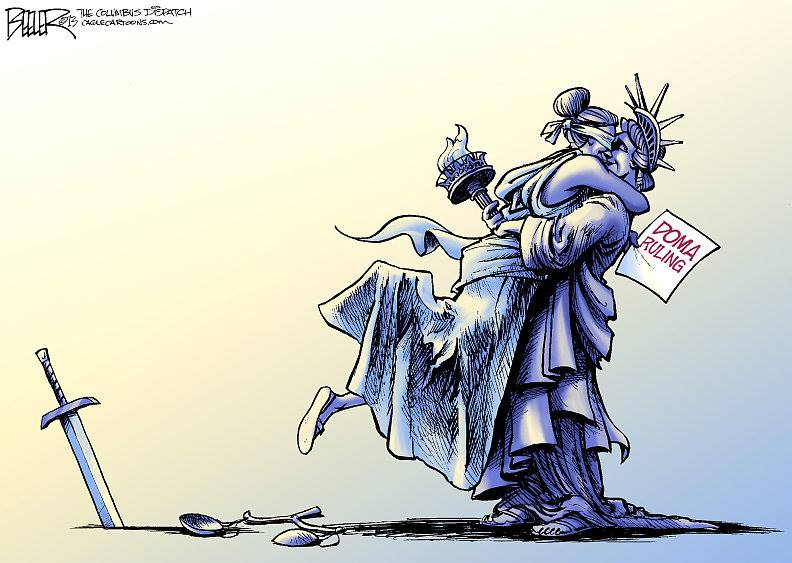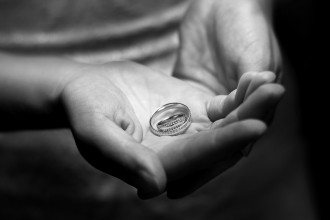People signing into Facebook, Twitter or any other social media or news outlet this morning were more than likely blinded by all the rainbow flag posts celebrating the Supreme Court’s decision to recognize and legalize same-sex marriages in all 50 states.

A bit like this, yes? (Source)
This landmark decision has been decades in the making, with Supreme Court justices weighing in on the side of marriage equality since 1996 and this final decision coming nearly 50 years after the Stonewall Riots marked the beginning of a new approach to gay rights advocacy. This decision comes as no surprise to the 37 states which had already legalized same-sex marriages. Instead, it served as official notice to the 13 states which had enacted laws expressly prohibiting same-sex partners from becoming legally wed. Among those states was my own home of Ohio.
Married at Home – Finally!
Ohio is a swing state, both in terms of its influence in presidential elections and in its attitudes as you travel through the area. I grew up in Cleveland and have spent the majority of my life in the state. I love it and grew up with an innate desire to defend it when people tried to mock it – one of the side effects of growing up in Cleveland. So I was especially interested to see the different reactions of people here and was, at turns, both heartened and discouraged. There are massive enclaves of LGBT supporters throughout Ohio including the well-known gay cities of Lakewood and Columbus. There are also expanses of rural Ohio where people tend to blend their religious fervor with political leanings – a mix that rarely ends well.
This decision will, I hope, draw a line in the sand over that argument. The decision affects the legality of marriages and makes no attempt to exert that understanding onto any sort of organized belief system. This is about the law – nothing more, nothing less. It affects zero percent of religious edicts, attitudes or covenants. This case resolves the legal aspects of marriage, but how we and our families will actually accepted in society is an entirely different matter.
What the Decision Means in the Real World
My wife (I get to say that now) called me this morning as soon as she heard the news. I was at home with our daughter, watching Elmo and picking up toys. As soon as I picked up the phone, my wife said two simple words that brought tears to my eyes.
“We’re legal.”
It may seem silly to some to feel a surge of emotions over a court decision. Even if they had come down on the other side, I wouldn’t have loved my wife or our daughter any less nor would I have seen our relationship as anything other than the best thing that’s ever happened to me. But it’s about more than a relationship – it’s about our family and the families of so many LGBT couples. Today our daughter is protected through a variety of different federal benefits. In time, our hope is that my wife can officially adopt our daughter, becoming her legal parent instead of a legal guardian.
The Stonewall Riots went down nearly 50 years ago and, just in that short amount of time, the LGBT community has coalesced and come together to do more than fight for equal rights. They’ve come together to share their stories and talk about the challenges, victories, shunnings, beatings, celebrations, adversities and joys they’ve each experienced. Those stories have made such an impact on society that public opinion itself has shifted dramatically over the past few years.
The best example of this isn’t actually today’s SCOTUS decision but the recent election in Ireland, a country known for its love of storytelling. In a country that rejected the idea of legalizing divorce until 1995, to have the majority of voters come out in public support for same-sex marriage is nothing short of amazing. Deputy Prime Minister Joan Burton acknowledged the power of the stories shared by members of the LGBT community as well as the narrative Ireland chose to be a part of with the vote. “In Ireland, we’re known as a nation of storytellers,” she said. “And today, the people have told quite some story. This is a magical, moving moment.”
Today’s ruling by the United States Supreme Court is one that will go down in history as being just as provocative and important as the likes of Brown v. Board of Education, Plessy v. Ferguson, Loving v. Virginia and Roe v. Wade. As with these other historic cases, the court addressed the legal implications of a contentious social issue dispassionately and fairly, but that doesn’t mean the job is done. It does, however, go a long way in giving people what they need in order to be more widely accepted – official recognition.
Already there are court clerks refusing to marry couples legally and the ink on the decision has barely fried. The ruling today may not sway people into accepting same-sex marriages culturally, but the protections and benefits a federally recognized marriage means that the rights of our families and our children won’t be subject to public opinion. It proves that same-sex couples are really no different than any other couple – we want to be together, we’ve chosen to face life side by side and, as a result, we are entitled to the same rights and responsibilities as everyone else and, more importantly, to be able to exercise those rights without fear of persecution.
Court cases – and punishments – focused on same-sex couplings date back to ancient Rome and today, finally, maybe we can begin to draw a line under it. The Supreme Court decision protects the rights of couples and their children, both individually and as a family unit. It offers legitimacy and credence to relationships that have spanned decades and to a group of people who have earned their right to the privilege of marriage through countless trials by fire. The legality of same-sex marriage may be breaking news but the legitimacy of these unions was never up for debate. Today, millions of people can now finally fulfill their dream of being married and being recognized as a family unit by their friends, family and fellow citizens. It gives children a more secure family home and gives communities a better sense of unity through the strengthening of relationships. If that doesn’t serve to strengthen the bonds of family and unity across the country and the world, nothing will.







3 Comments